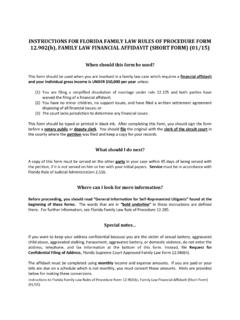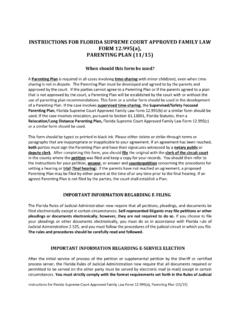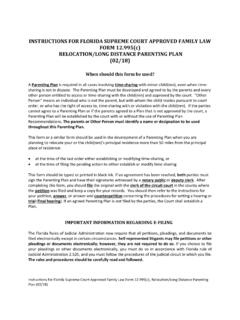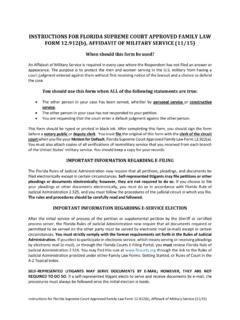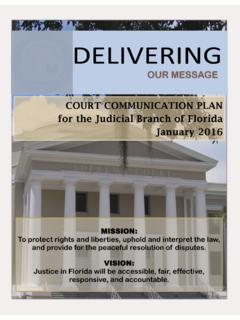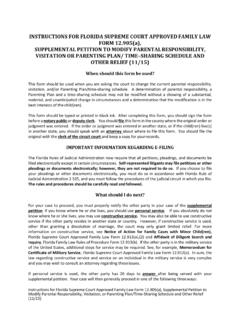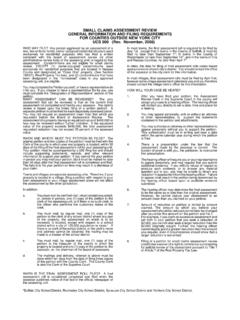Transcription of INSTRUCTIONS FOR FLORIDA SUPREME COURT …
1 INSTRUCTIONS FOR FLORIDA SUPREME COURT approved family LAW FORM (a), petition TO DETERMINE PATERNITY AND FOR RELATED RELIEF (11/15) When should this form be used? This form should be used by a birth mother or father to ask the COURT to establish paternity, a time-sharing schedule, and/or child support of a minor child or children. This means that you are trying to legally establish who is the father of the child(ren). This form should be typed or printed in black ink. After completing this form, you should sign the form before a notary public or deputy clerk. You should file the original with the clerk of the circuit COURT in the county where you live and keep a copy for your records.
2 IMPORTANT INFORMATION REGARDING E-FILING The FLORIDA Rules of Judicial Administration now require that all petitions, pleadings, and documents be filed electronically except in certain circumstances. Self-represented litigants may file petitions or other pleadings or documents electronically; however, they are not required to do so. If you choose to file your pleadings or other documents electronically, you must do so in accordance with FLORIDA Rule of Judicial Administration , and you must follow the procedures of the judicial circuit in which you file. The rules and procedures should be carefully read and followed. IMPORTANT INFORMATION REGARDING E-SERVICE ELECTION After the initial service of process of the petition or supplemental petition by the Sheriff or certified process server, the FLORIDA Rules of Judicial Administration now require that all documents required or permitted to be served on the other party must be served by electronic mail (e-mail) except in certain circumstances.
3 You must strictly comply with the format requirements set forth in the Rules of Judicial Administration. If you elect to participate in electronic service, which means serving or receiving pleadings by electronic mail (e-mail), or through the FLORIDA Courts E-Filing Portal, you must review FLORIDA Rule of Judicial Administration You may find this rule at through the link to the Rules of Judicial Administration provided under either family Law Forms: Getting Started, or Rules of COURT in the A-Z Topical Index. SELF-REPRESENTED LITIGANTS MAY SERVE DOCUMENTS BY E-MAIL; HOWEVER, THEY ARE NOT REQUIRED TO DO SO. If a self-represented litigant elects to serve and receive documents by e-mail, the procedures must always be followed once the initial election is made. To serve and receive documents by e-mail, you must designate your e-mail addresses by using the Designation of Current Mailing and E-mail Address, FLORIDA SUPREME COURT approved family Law Form , and you must provide your e-mail address on each form on which your signature appears.
4 Please CAREFULLY read the rules and INSTRUCTIONS for: Certificate of Service (General), FLORIDA SUPREME COURT approved family Law Form ; Designation of Current Mailing and E-mail Address, FLORIDA SUPREME COURT approved family Law Form ; and FLORIDA Rule of Judicial Administration INSTRUCTIONS for FLORIDA SUPREME COURT approved family Law Form (a), petition to Determine Paternity and for Related Relief (11/15) What should I do next? For your case to proceed, you must properly notify the respondent of the petition . If you know where he or she lives, you should use personal service.
5 If you absolutely do not know where he or she lives, you may use constructive service. However, if constructive service is used, the COURT may only grant limited relief. You should seek legal advice on constructive service in a paternity case. For more information see chapter 49, FLORIDA Statutes, or you may contact Child Support Enforcement at the FLORIDA Department of Revenue if you need assistance with your case. If personal service is used, the respondent has 20 days to answer after being served with your petition . Your case will then generally proceed in one of the following three ways: If after 20 days, no answer has been filed, you may file a Motion for Default, FLORIDA SUPREME COURT approved family Law Form (a), with the clerk of COURT . Then, if you have filed all of the required papers, you may call the clerk, family law intake staff, or judicial assistant to set a final hearing. You must notify the other party of the hearing by using a Notice of Hearing (General), FLORIDA SUPREME COURT approved family Law Form , or other appropriate notice of hearing form.
6 If the respondent files an answer that agrees with everything in your petition or an answer and waiver, and you have complied with mandatory disclosure and filed all of the required papers, you may call the clerk, family law intake staff, or judicial assistant to set a final hearing. You must notify the other party of the hearing by using a Notice of Hearing (General), FLORIDA SUPREME COURT approved family Law Form , or other appropriate notice of hearing form. If the respondent files an answer or an answer and counterpetition, which disagrees with or denies anything in your petition , and you are unable to settle the disputed issues, you should file a Notice for Trial, FLORIDA SUPREME COURT approved family Law Form , after you have complied with mandatory disclosure, completed the scientific paternity testing, if necessary, and filed all of the required papers. Then you should contact the clerk, family law intake staff, or judicial assistant for INSTRUCTIONS on how to set your case for trial (final hearing).
7 If the respondent files an answer and counterpetition, you should answer the counterpetition within 20 days using an Answer to Counterpetition, FLORIDA SUPREME COURT approved family Law Form (d). Where can I look for more information? Before proceeding, you should read General Information for Self-Represented Litigants found at the beginning of these forms. The words that are in bold underline in these INSTRUCTIONS are defined there. For further information, see chapter 742, FLORIDA Statutes. Special If you do not have the money to pay the filing fee, you may obtain an Application for Determination of Civil Indigent Status, fill it out, and the clerk will determine whether you are eligible to have filing fees deferred. More than one child of the same alleged father may be listed on a single petition . However, if you are filing a paternity action involving more than one possible father, a separate petition must be filed for each INSTRUCTIONS for FLORIDA SUPREME COURT approved family Law Form (a), petition to Determine Paternity and for Related Relief (11/15) alleged father.
8 If the respondent files an answer denying that the person named in the petition is the child(ren) s father, one of you should file a Motion for Scientific Paternity Testing, FLORIDA SUPREME COURT approved family Law Form (e). This is used to ask the COURT to order a scientific test to determine who is the child(ren) s father. If the father signed papers at the hospital acknowledging that he was the father, paternity was established as a matter of law. This should be indicated on page 2, section 9a on this form. If the paternity of a child who was conceived or born during a marriage is at issue, the COURT may appoint a guardian ad litem to assist the COURT in this matter and to protect the rights of child. With this petition , you must file the following and provide a copy to the other party: Uniform Child Custody Jurisdiction and Enforcement Act (UCCJEA) Affidavit, FLORIDA SUPREME COURT approved family Law Form (d). Notice of Social Security Number, FLORIDA SUPREME COURT approved family Law Form (j).
9 family Law Financial Affidavit, FLORIDA family Law Rules of Procedure Form (b) or(c). Certificate of Compliance with Mandatory Disclosure, FLORIDA family Law Rules of Procedure Form (This must be filed within 45 days, if not filed with the petition , unless you and the other party have agreed not to exchange these documents.) Child Support Guidelines Worksheet, FLORIDA family Law Rules of Procedure Form (e). (If you do not know the other party s income, you may file this worksheet after his or her financial affidavit has been filed.) Parenting Plan, FLORIDA SUPREME COURT approved family Law Form, (a), (b), or (c). If the parents have reached an agreement, a signed and notarized Parenting Plan should be attached. If the parents have not reached an agreement, a proposed Parenting Plan may be filed. Parenting Plan and Time-Sharing. If the parties are unable to agree on parenting arrangements and a time-sharing schedule, a judge will decide as part of establishing a Parenting Plan.
10 The judge will decide the parenting arrangements and time-sharing based on the child(ren) s best interests; Regardless of whether there is an agreement between the parties, the COURT reserves jurisdiction to modify issues relating to minor or dependent child(ren). The judge may request a parenting plan recommendation or appoint a guardian ad litem in your case. This means that a neutral person will review your situation and report to the judge concerning parenting issues. The purpose of such intervention is to be sure that the best interests of the child(ren) are being served. For more information, you may consult sections , FloridaStatutes. Listed below are some terms with which you should become familiar before completing your petition . If you do not fully understand any of the terms below or their implications, you should speak with an attorney before going any further. Shared Parental Responsibility Sole Parental Responsibility Supervised Time-Sharing INSTRUCTIONS for FLORIDA SUPREME COURT approved family Law Form (a), petition to Determine Paternity and for Related Relief (11/15) No contact Parenting Plan Parenting Plan Recommendation Time-Sharing Schedule Many circuits require that parents of a minor or dependent child(ren) who are involved in dissolution or paternity actions attend mediation before being allowed to schedule a final hearing.

